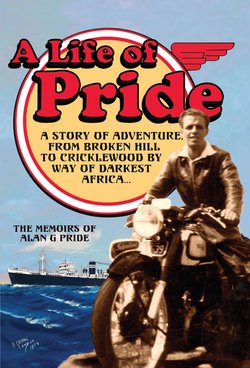Читать книгу A Life of Pride - Alan G Pride - Страница 10
На сайте Литреса книга снята с продажи.
Chapter 3
To the Warkaroo Hills
ОглавлениеAlthough my father, brought up in the 1890s Depression, was a workaholic who never took us on outings, the Zinc Corporation provided some recreation for its employees. There was a swimming pool, and a gym run by a bloke called Jack Fitzgerald. He also ran a camp every May school holidays, for 20 or 30 of us boys. We’d all pile into the back of a couple of trucks and rattle to the campsite in the Warkaroo Hills, 30 miles out of town. There were huge rocks on one side and a dry creekbed on the other. We’d set up our tents and make our beds near the creekbed. Water was carted out in a big tank on the truck and we had a BBQ set up on bricks for hot meals.
Lectures to improve our young minds...
Our days started early: dress, wash faces in a big communal bowl, and all go for a run down the creekbed behind Jack. Some of the other boys’ fathers took the time to come and help out , so sausages, eggs and bacon would be sizzling on the BBQ when we came back. The rest of the day would be spent walking, kite-flying, footy playing and learning about the desert plants and animals. At night, there’d be campfire lectures to improve our young minds.
If you look at the photos, it all seems very dry and spartan, but we really enjoyed it and looked forward to it all year.
A view of the camp from the hill top.
A run down the creek bed before breakfast.
Another time, a group of us desert boys went to a scout camp about 900 miles from Broken Hill, at Mt Keira on the east coast of NSW. It was quite a shock when we arrived in the lush forest, so much green in one place!
The leeches were another shock; we’d no such things in the racecourse dam or creek swimming-holes.
One afternoon, we were all taken by bus to Wollongong for a movie. I went next door for a milkshake afterward and when I returned, the bus was gone! They’d left without even counting the kids. I was a bit worried at being stranded in a strange town, so I asked for directions to Mt Keira and started walking. It was a long trudge. I finally got into camp, to find that no one had realised I was missing! There’d be a scandal if such a thing happened nowadays.
I had lots of fun in a Pipe and Drum band at primary school, buying my own royal blue uniform and performing at shows, sports days and marches around Broken Hill.
During World War II, we had air-raid shelters at school. This meant air-raid practice, which was a great break from lessons. We’d rush out of class and pile into the shelters, which were just big trenches in the playground, roofed with railway sleepers and soil. Since we never had any air-raids, it was all a bit of a game. I wrote and illustrated stories in which German airmen were gorily shot down by Allied aircraft. (I still have some of those stories. They were left in our cellar when the Oxide Street house was sold : the exercise books were found and returned to me by the new owner.)
Flight Sergeant Davis getting ready to patrol...
School lunchtimes were spent running around, playing in the bare dirt. This sometimes developed into gang fights, where we’d divide into sides and throw stones at each other – one more thing which wouldn’t be tolerated now. One session of this game ended with my being hit on the head by a large, flat rock, thrown by a boy called Rex Moe. There was blood everywhere and I had to be washed and bandaged up.
Later the headmaster, Mr Doust, called me to his office and demanded to know who’d thrown the stone. I said I didn’t know. The point is, I was about 12 then and when I was about 70, I got a phone call from Rex Moe. He was then retired and living on the Central Coast. He’d found my number in the Sydney phone book and called, because he’d always wanted to thank me for not dobbing him in!
A hangar scene, foreshadowing a life of mechanics...
